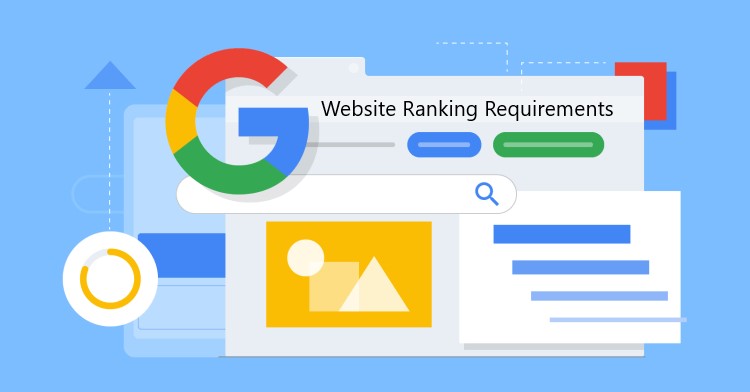Navigating the complexities of Google requirements for website ranking can seem daunting. However, understanding these essentials is crucial for any business looking to improve its online visibility. It’s important to understand the intricacies of SEO, mobile optimization, the quality of content and page speeds. Each of these factors plays a pivotal role in how both users and search engines perceive your website. Below we’ll go over important components that influence Google rankings. We’ll also provide actionable insights and strategies to help you secure a top spot in search results. Mastering these elements is essential for driving traffic and achieving online success.
Search Engine Optimization (SEO) Basics
Understanding the basics of Search Engine Optimization (SEO) is crucial for meeting Google requirements for website ranking. SEO encompasses a range of strategies and techniques for enhancing the visibility and ranking of a website on search engines. The first step in this process is keyword research. This involves identifying the words and phrases that potential customers use when searching on Google. This insight allows you to tailor your website content to align with these search terms. This, in turn, increases the chances that your target audience will find you.
Moreover, on-page optimization plays a pivotal role in SEO. This includes optimizing individual web pages to rank higher in search engines. Key elements of on-page optimization involve ensuring that your titles, headings, and content not include relevant keywords. It’s also important to structure them in a way that enhances readability and user engagement. Additionally, the proper use of meta tags, such as the title tag and meta description, is essential. These tags help search engines understand the content of your pages. They also influence how search results present your pages.
Metadata, another fundamental aspect of SEO, provides search engines with more information about the webpage. This includes details like the page’s topic and the keywords it contains, which can significantly impact its ranking. Properly utilized, metadata improves the likelihood that a site will meet the specific Google requirements for website ranking.
Furthermore, SEO is not just about implementing the right keywords or meta tags. It’s also about continuously updating content to keep it relevant and engaging. This ongoing effort ensures that your website remains competitive in search engine rankings, attracting more visitors over time.
Mobile Optimization
Mobile optimization has become a critical factor in meeting Google requirements for website ranking. This approach prioritizes the mobile version of a website over its desktop counterpart when evaluating content and assigning rankings. Given the surge in mobile device usage for internet access, having a mobile-friendly website is no longer optional but essential.
To optimize your site for mobile devices, start by ensuring that your website design is responsive. This means that the layout and content dynamically adjust to fit the screen size of the device in use. Responsive design not only improves user experience but also reduces the risk of common mobile-related issues. This includes unreadable text and misaligned elements, which can negatively impact your site’s search engine rankings.
Additionally, pay close attention to page load speed. Mobile users expect quick access to information, and slow-loading pages can lead to high bounce rates. Optimize images, leverage browser caching, and minimize code to speed up loading times. Tools like Google’s PageSpeed Insights can provide specific recommendations for improving your site’s performance on mobile devices.
Navigation is another crucial aspect of mobile optimization. Ensure that menus are easy to access and navigate on a small screen. Also consider touch-friendly design elements to enhance usability. Simplifying the user journey on your mobile site can lead to better engagement and longer visit durations.
Lastly, avoid using flash or other software not commonly supported on mobile devices. This can render your content inaccessible to a significant portion of your audience.
Quality Content Creation
Quality content creation is a cornerstone of meeting Google requirements for website ranking. High-quality, relevant content not only attracts more visitors but also encourages them to stay longer on your website, both of which are crucial metrics for search engine rankings. Originality, depth, and engagement are key aspects that define the quality of content and significantly influence its effectiveness in SEO.
Original content is vital because it ensures your website offers something unique to visitors, differentiating it from competitors. Google’s algorithms are finely tuned to identify and reward originality, as it indicates that the website provides valuable information that cannot be found elsewhere. This not only improves your rankings but also establishes your site as a reputable source in your field.
Depth is equally important. Content that covers a topic comprehensively tends to perform better in search rankings. Detailed articles that answer multiple facets of a user’s query are more likely to be seen as authoritative. For example, in-depth guides, case studies, and detailed analyses tend to attract more backlinks and social shares, further boosting SEO efforts.
Engagement is crucial for retaining the interest of visitors. Engaging content encourages visitors to interact with your website, whether it’s through comments, shares, or spending extended time exploring related topics. This behavior signals to Google that users find the content valuable, which can lead to higher rankings. To enhance engagement, employ a clear, accessible writing style, use visual aids like images and videos, and invite reader interaction through questions or calls to action.
Page Speed and User Experience (UX)
Page speed is a critical component of user experience (UX) and plays a significant role in meeting Google requirements for website ranking. Faster websites provide a better user experience, as visitors are less likely to become frustrated with slow loading times and more likely to engage with the content. Google recognizes this correlation and prioritizes faster websites in its search rankings to ensure users have access to the best possible online experiences.
To improve website speed, several tools and methods can be employed. Google’s PageSpeed Insights is a vital tool that analyzes the content of a web page, then generates suggestions to make that page faster. Implementing these suggestions can drastically reduce load times. Common recommendations include minimizing the size of CSS, JavaScript, and images, which can significantly boost speed.
Furthermore, leveraging browser caching can help speed up your site for repeat visitors. By storing elements of your website locally in the user’s browser, the amount of data that needs to be transferred on subsequent visits is reduced, making pages load faster. Another effective strategy is to utilize a content delivery network (CDN), which distributes your site’s files across a network of servers globally, reducing the distance data has to travel to reach users.
Improving server response time is also crucial. This can be achieved by choosing quality hosting solutions, optimizing databases, and keeping your web server software up to date. Each of these actions can reduce delays in loading data, enhancing overall site performance.
By focusing on these areas, businesses can significantly improve their website’s speed and UX, aligning with Google’s emphasis on fast, responsive sites. This not only aids in fulfilling the Google requirements for website ranking but also enhances user satisfaction and engagement, which are key to online success.
Backlinks and Authority
Building a strong backlink profile is essential in satisfying Google requirements for website ranking, as it significantly influences a website’s authority and trust. Backlinks, which are links from other websites to yours, are interpreted by Google as votes of confidence. Each link signals to Google that another site finds your content valuable enough to link to it, thereby boosting your site’s perceived authority.
The quality of these backlinks plays a critical role in how they impact your rankings. Links from reputable and relevant sites contribute more positively to your site’s authority than those from less reputable sources. Therefore, it is crucial to focus on gaining high-quality backlinks rather than simply increasing the quantity of links. Engaging in ethical link-building practices, such as creating shareable, high-quality content that naturally attracts links, is more beneficial than resorting to manipulative link schemes that can lead to penalties from Google.
Moreover, the concept of trust is closely tied to authority. Sites that are recognized as authoritative sources in their industry tend to rank higher because Google considers them reliable and trustworthy. This trust is cultivated not only through backlinks but also through consistent publication of accurate and helpful content, secure website technology, and positive user signals such as low bounce rates and high engagement levels.
To effectively build and maintain a strong backlink profile, tools like Ahrefs, Moz, and SEMrush can be instrumental. They help monitor which sites are linking to you, the quality of those links, and how your backlink profile grows over time. These insights allow you to adjust your strategies and focus on fostering relationships with authoritative websites in your niche.
Conclusion
In conclusion, understanding and implementing Google’s requirements for website ranking is crucial for any business seeking to enhance its online presence. From mastering SEO basics to ensuring mobile optimization, creating quality content, optimizing page speed, and building a strong backlink profile, each element plays a significant role in how effectively a website communicates its relevance and authority to Google. By focusing on these key areas, businesses can improve their search engine rankings, attract more traffic, and ultimately achieve greater online success. Embracing these strategies will not only meet Google’s criteria but also provide a better user experience, making your site a trusted resource for visitors.



